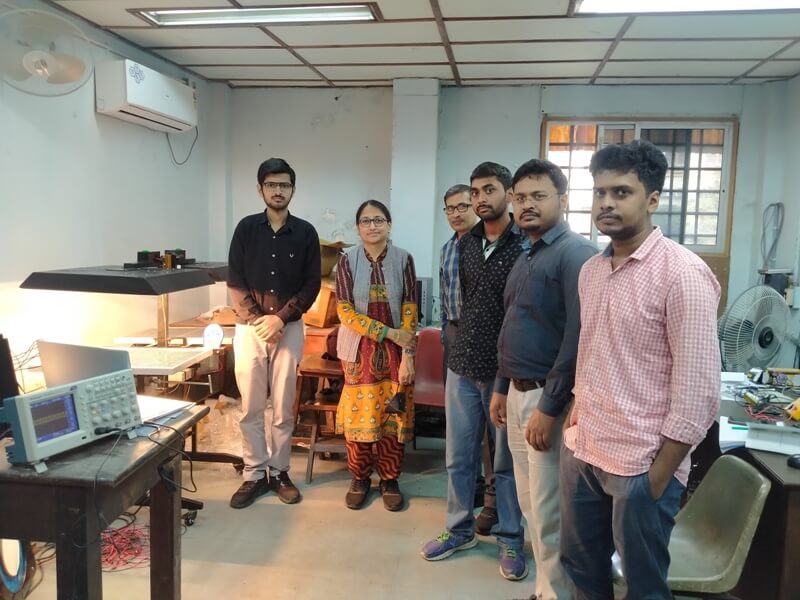Shibpur's IIEST serves as a centre for advanced study and research. The creation and transmission of knowledge, the production of highly qualified engineers, scientists, and entrepreneurs equipped with the newest technologies, and the development of innovative technological solutions for societal causes are among the top activities.
The history of the Institute is lengthy. Since 1856, it has been empowering the country. It is India's third engineering college when ranked by establishment year, but when ranked by graduation year, it is India's second-oldest engineering institution. It comprises 8 schools and 16 sections. It has more than 250 staff members and more than 4000 students.
IIEST Shibpur, recently ordered Solar PV Training and Research system from Ecosense for their students to experiment and further their research on Solar PV concepts.
Solar PV Training and Research System
Solar PV Training and Research system is a compact miniaturised version of an actual Solar PV standalone power plant. The system enables user to study wiring and interconnections of different components involved in the system to develop basic understanding of working and operation of a Standalone PV system. Through the help of experiments a student can understand underlying principles of solar PV, its applications in standalone system and challenges like sizing of system, MPPT, installations etc. by doing various experiments. The system also provides scope for further research.
The system is an indoor system which utilises halogen lamps to act as artificial sun to illuminate to solar panels which can be configured in series or parallel depending upon experiments and requirements of users. The experiments are divided into 3 sections: a) Solar PV characteristics, b) Standalone PV system and c) Research experiments. In the first section i.e., Solar PV characteristics there are 5 experiments through which a user can study about Solar PV characteristics, interconnection of solar panel, effect of tilt, radiation and temperature on solar panels and usage of diodes in a solar panel. In second section there are 4 experiments through which user can study about the different components involved in solar PV standalone systems, their interconnection and usage. In third section user can research on maximum power point tracking of the solar panels.
The system consists of individual plug-in units each with components for different experimental arrangement. The conception of system facilitates indoor as well as outdoor experiments.
What can one learn using the system?
A. Science behind Solar Photovoltaics
• To demonstrate the I-V and P-V characteristics of PV module with varying radiation and temperature level
• To demonstrate the I-V and P-V characteristics of series and parallel combination of PV modules.
• To show the effect of variation in tilt angle on PV module power.
• To demonstrate the effect of shading on module output power.
• To demonstrate the working of diode as Bypass diode and blocking diode.
B. Standalone Photovoltaic Systems
• Workout power flow calculations of standalone PV system of DC load with battery.
• Workout power flow calculations of standalone PV system of AC load with battery.
• Workout power flow calculations of standalone PV system of DC and AC load with battery.
• To draw the charging and discharging characteristics of battery.
C. Research based Experiments
• Find the MPP manually by varying the resistive load across the PV panel.
• Find the MPP by varying the duty cycle of DC-DC converter.
• Observe the Vm, Im, Pm and duty cycle at which MPP occurs, with MPP algorithm.
• Observe the response of Pm in the plotter and compare with the Pm observed in previous experiment.
• Perform the previous three Experiment with only battery in the circuit.
• Observe the output waveform of the inverter in auto mode.

Ecosense installed Solar PV Training and Research System at Department of Electrical Engineering, IIEST, Shibpur
Technical Advantages of the Solar PV Training and Research System
• An active measurement panel to measure different voltages, currents and temperature.
• User can vary Irradiation to simulate sunlight conditions during the day which further affects the temperature of Solar Panel to study I-V and P-V characteristics under varying irradiation and temperature.
• Series and Parallel Combination of Solar Panels possible.
• Arrangement to tilt solar panels to study the effect of Tilt angle on PV module Power.
• Shading blades are provided to study the effect of shading on Solar PV.
• No connections are made internally to encourage user to learn connecting different components together in order to install a standalone Solar PV standalone power plant.
• Workout power flow calculations of Standalone PV power plant using charge controller, inverter, AC /Dc load and Battery.
• Option to provide external gate signals to charge controller via Function generator to study effect of change in Duty Cycle of charge controller on PV Power.
• User can externally feed MPPT signal to study effect of MPPT algorithm on PV Power.
• User can use his/her own MPPT algorithm to study the effect of MPPT algorithm on PV Power
• User can plot Real time PV, IV, V vs time, P vs Time, I vs Time curves using proprietary PC Software.
• Perturb and Observe MPPT Algorithm
• IP 65 protected PV Panels
• Equipped with Handheld Solar Insolation measuring instrument
• Equipped with an angle measurement instrument
• Data can be saved in csv format
• Graphs can be saved in image format
Demonstration of Equipment Conducted
After Successful installation of equipments, complete demonstration of equipment conducted. The demonstration and training session was joined by faculty members and students of the department.
